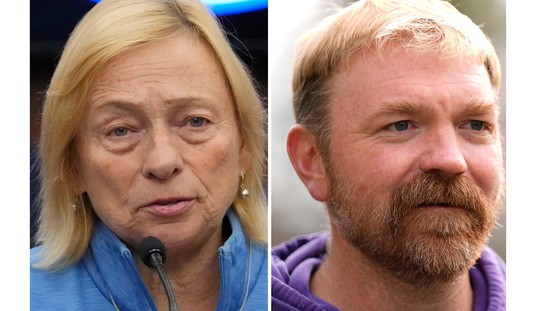Jacob Frey has decided to fight back. The mayor of Minneapolis has gotten deluged with criticism over the feckless response to riots in the Third Precinct, including his tearful press conference at the beginning when he seemed more interested in rebuking Donald Trump than in taking control of his city. In an interview with the Star Tribune, however, Frey said he’d repeatedly requested the National Guard to restore order — and it was Governor Tim Walz who dithered and delayed.
And, at least according to the Strib, Frey has the records to prove it (via Gary Gross):
“Through an extremely difficult situation, I told the truth,” Frey said Monday. “I relayed information as best I could to state partners. And we did what was demanded for the sake of our city.”…
On Wednesday, May 27, the second evening of unrest around the Third Precinct, Frey said Police Chief Medaria Arradondo called him at 6:23 p.m. to say that the Target store near the police station was being looted and that he needed the National Guard.
Frey said he immediately telephoned Walz, at 6:29 p.m., relayed information, and asked him to send in the National Guard. “We expressed the seriousness of the situation. The urgency was clear,” Frey said.
“He did not say yes,” Frey said of Walz. “He said he would consider it.”
Frey insisted that he explicitly asked whether his verbal requests constituted a formal request, and the governor’s staff confirmed that they did. The governor’s office disputes that.
The newspaper reviewed e-mails and text messages that tend to support Frey’s position — to a point. Walz and public-safety commissioner John Harrington dispute Frey’s version of events in two ways. First, Walz says that Frey didn’t put the request in writing, as is required for such an extraordinary act. Second, Harrington argued, Frey was so vague about what was needed that Walz couldn’t put together an action plan for the deployment:
The governor’s office disputed several of Frey’s assertions. According to the office: The Governor’s staff told Frey a verbal request cannot be considered an official request for the National Guard; the city’s request did not focus on protecting the Third Precinct; and the National Guard mobilized Thursday morning and was on the ground in the Twin Cities within 24 hours of Frey’s informal request. …
“They weren’t specific about what they wanted or any details on what the mission would be,” Harrington said. Then, when they received a list of areas they needed help with, “the list was so all-encompassing we could not possibly staff all the things they wanted.”
Oddly, though, Walz and Harrington still called up the Guard on Thursday evening — but only 90 of them deployed that night. And as it turns out, the Star Tribune found communications from Police Chief Medaria Arradondo to Harrington that sound, well, pretty darned specific:
At 9:11 p.m. Wednesday, Arradondo sent an e-mail to Harrington that included an attachment requesting “assistance of the MN National Guard for immediate assistance with significant civil unrest occurring in the City of Minneapolis.” …
It listed a four-point mission plan: “Area Security and Force Protection Operations,” “Area Denial Operations,” “Transportation assistance for law enforcement officers,” “Logistical assistance for the overall security operation.”
Arradondo asked for 600 National Guard soldiers “along with compliment [sic] of command and control,” as well as vehicles. The National Guard would report to police department supervisors, who would coordinate with the National Guard’s leaders.
At 12:23 p.m. the following day, Arradondo sent Harrington an e-mail that included a list of “critical infrastructure sites to be protected,” listing the five police precincts and other government and medical buildings and businesses along Lake Street and other areas.
Ten hours later, Walz and Harrington deployed less than a hundred Guard soldiers, who had no impact at all on disorder in the streets. It took another full day for the state to order up a major deployment of its Guard, eventually numbering seven thousand-plus, to spread out across the Twin Cities and tamp down rioting and looting.
By that time, it was too late for the Third Precinct, which had burned to the ground, at which point Walz called the city’s response to the rioting an “abject failure.” Frey still resents that attack from Walz, calling it a “hit in the gut.” From this sequence of events, it’s tough to blame him for holding that grudge.
But even without Frey’s requests, this is still on Walz. Frey doesn’t have any authority to call up the National Guard, and Walz didn’t need to wait for a request from Frey to do it. As governor, Walz has plenary authority to deal with disasters and unrest in the state by using the Guard to restore order when necessary. By the time Frey first called for the Guard, the need to restore order and protect the city’s assets and buildings had become obvious. It should have been Walz calling Frey to inform him that the Guard was on its way and to formulate a plan to coordinate between the deployment and police leadership. That wasn’t the moment to ask for Form 1262-B to be filled out in triplicate and sent to the Department of Pretty Please With Sugar On Top before executive action was taken.
Frey’s track record is bad enough. In this case, though, the true “abject failure” happened at the very top. Walz is an abject embarrassment, and his administration seems intent on continuing to prove it.








Join the conversation as a VIP Member